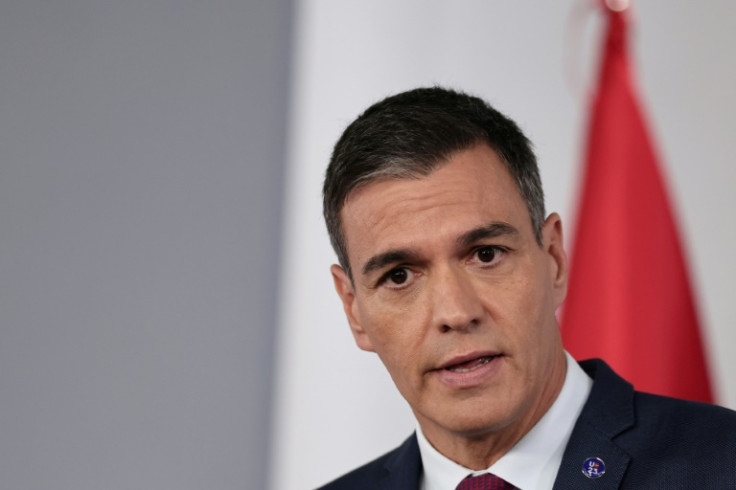Spain King Tasks Sanchez With Forming Govt

Spain's acting Prime Minister Pedro Sanchez vowed Tuesday to be "generous" with Catalan separatists whose support he needs to remain in power after King Felipe VI tasked him with forming the next government.
Sanchez's Socialists came second in an inconclusive general election in July, in which the right-wing Popular Party (PP) won the most votes.
If Sanchez is to be reinstated as premier, he will need to pass a key parliamentary vote for which he will need the backing of a hardline Catalan separatist party cast in the role of kingmaker.
The king turned to Sanchez after PP leader Alberto Nunez-Feijoo failed in his own bid to win parliamentary support to be inaugurated as prime minister last week, having only managed to win support from the far-right Vox.
Sanchez, who has governed Spain since he led a successful no-confidence vote against former PP prime minister Mariano Rajoy in 2018, said he accepted the king's offer and would start talks with the different parliamentary groups on Wednesday.
"I will meet with all the different parliamentary parties except the far-right Vox, obviously," he told a news conference.
Sanchez will now have to seek support from at least 176 lawmakers within the 350-seat parliament in the vote which must take place before November 27.
If he fails, Spain will automatically be forced to hold new elections, most likely in mid-January.
Sanchez has proved to be a tenacious political survivor and is confident he will be returned to power with the backing of the hard-left Sumar along with Basque and Catalan regional parties.
But crucially, he will need the votes of seven JxCat lawmakers, who have demanded an amnesty for the hundreds of activists and politicians facing legal action over Catalonia's failed 2017 separatist bid which sparked Spain's worst political crisis in decades.
Such a move is vehemently opposed by the right and also crosses a red line for some within Sanchez's own Socialist party.
An anti-independence group is organising a protest in Barcelona on Sunday against the amnesty, and Feijoo and other top PP officials have said they will take part.
Sanchez acknowledged the negotiations "are going to be complex" but said he was "confident" they will be successful.
"One can't head a government... without understanding the political plurality of parliament or the territorial diversity of Spain. It is therefore time for... generosity," he added when asked if he would agree to the amnesty demand.
Among those who would benefit is JxCat leader Carles Puigdemont, who headed Catalonia's regional government during the 2017 secession bid.
He fled Spain shortly after and currently lives in self-imposed exile in Belgium.
Sanchez, who has sought to calm separatist tensions since coming to office five years ago, in 2021 pardoned Catalan separatist leaders who were serving long prison terms over the secession bid.
But he has always opposed an amnesty and his government has insisted Puigdemont should stand trial in Spain.
Catalan separatists are also pushing for an independence referendum which "threatens to throw a wrench into the negotiations," said Federico Santi, a senior analyst for Europe at Eurasia Group.
Unlike an amnesty, a referendum is "not something Sanchez could concede to without paying a heavy political price, even if it were legally feasible," he explained.
He said there was a 40 percent chance of Spain holding repeat elections.
Sanchez has firmly rejected a referendum.
On Tuesday, he defended his record on Catalonia saying his openness to dialogue and the pardons had reduced tensions in the wealthy northeastern region.
"What Catalans want is to turn the page," he said.
© Copyright AFP 2024. All rights reserved.











